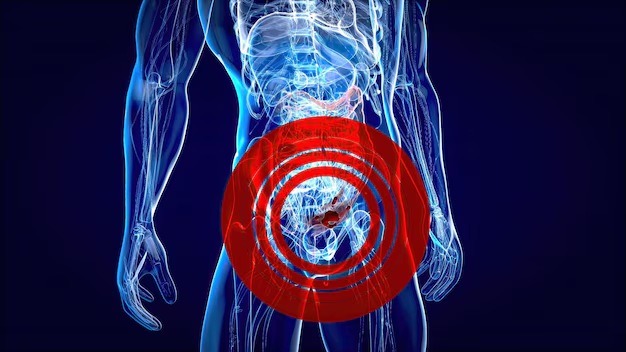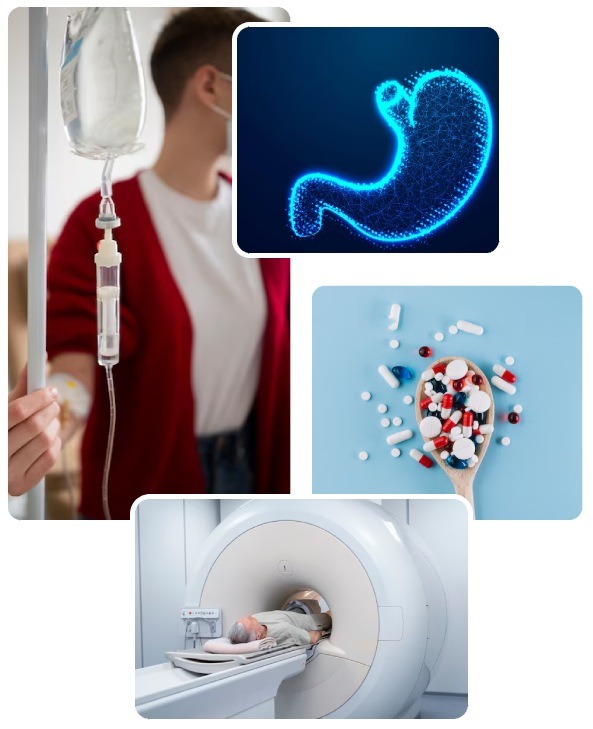Colon Cancer
Home / Treatment / Gastrointestinal Cancer / Colon Cancer

Colon Cancer Doctor in Kolkata
Colon cancer is a serious condition which is also known as colorectal cancer. It affects millions of people globally which begins in the colon, the longest part of the large intestine, and can spread to other parts of the body if left untreated. This cancer can affect both men and women and often starts as small, benign polyps that eventually turn cancerous. The colon oncologist in Kolkata is dedicated to providing awareness about the signs, symptoms, causes and available treatment options for patients who are suffering from colon cancer. Early detection plays an important role in increasing the colon cancer survival rate, to understand its development and treatment.

Signs and Symptoms of Colon Cancer
It is one of the important questions whether colon cancer can be cured or not. To know the answer, it is crucial to identify the signs and symptoms of colon cancer. The colon cancer symptoms of the initial stage are often unnoticeable. However, recognizing the colon cancer early stage symptoms can greatly impact outcomes. Common symptoms include:
Constant changes in bowel habits
Diarrhoea, constipation, or changes in stool consistency lasting more than a few weeks.
Blood in the stool
This is one of the more visible signs that should not be ignored.
Abdominal discomfort
Cramps, gas, or pain in the lower abdomen could signal underlying issues.
Fatigue and weakness
Unexplained fatigue can indicate anaemia, which may occur due to blood loss in the digestive tract.
Sudden weight loss
Significant weight loss without a clear cause may be a sign of colon cancer.
These symptoms can vary between men and women, but some studies suggest that colon cancer symptoms may present differently, such as bloating and pelvic discomfort. If you identify these signs early, you can lead to quicker diagnosis and better management of the conditions.
Causes and Risk Factors
Certain factors can increase the risk of colon cancer. Let us identify the causes of this disease.
Age-Related Risk Factor
The risk of colon cancer increases with age, especially after 50.
Genetic Predisposition
A family history of colon cancer or polyps increases your risk.
Dietary Influence
High-fat diets, particularly those rich in red and processed meats, may contribute to the growth of colon cancer.
Lifestyle and Habits
Smoking, excessive alcohol consumption and lack of exercise can increase the risk.
Underlying Health Conditions
Conditions like Crohn’s disease or ulcerative colitis may increase the likelihood of developing colon cancer.
Genetics also play a crucial role in developing colon cancer but can also be preventable through lifestyle changes. If you want to know how to prevent colon cancer, it’s necessary to adopt a healthy diet rich in fibre and avoid smoking and excessive drinking.

Diagnosis of Colon Cancer
If you notice any symptoms of colon cancer, the doctor can recommend various tests ad screenings to help confirm the diagnosis. Some common diagnostic tools include:
Colonoscopy
This procedure allows doctors to view the entire colon and remove any polyps that could become cancerous.
Biopsy
A sample of tissue is taken and examined under a microscope to confirm whether it is cancerous.
Imaging tests
CT scans, MRIs, and ultrasounds may be used to determine the extent of the cancer and whether it has spread.
Colon cancer is staged using the colon cancer TNM staging system, which evaluates the size of the tumour (T), whether cancer has spread to nearby lymph nodes (N), and whether it has metastasized to other organs (M). By recognising these stages, the doctor can make the necessary treatment decisions.

Treatment Options for Colon Cancer
Colon cancer management depends on the stage of the disease and the patient’s overall health conditions. Early detection makes colon cancer treatable with higher success rates.
The cancer specialist offers expert care in colon cancer treatment, providing advanced therapies for personalized patient outcomes in Kolkata.
Let us explore some common treatment options:
Chemotherapy
Chemotherapy is often used to kill remaining cancer cells and reduce the risk of recurrence. Colon cancer chemotherapy can be effective in both early and advanced stages.
Radiation therapy
This treatment may be used to target cancer cells in specific areas, especially in advanced cases where the cancer has spread.
Targeted therapy
This treatment may be used to target cancer cells in specific areas, especially in advanced cases where the cancer has spread.
If you undergo proper treatment, colon cancer can be cured in many cases, particularly when detected early. However, colon cancer end-stage symptoms can be more difficult to manage, and treatment at this stage often focuses on improving the quality of life rather than curing the disease.
Colon cancer is a serious but often preventable disease. The main thing is to be aware of the signs and symptoms to improve the colon cancer survival rate. If you’re in Kolkata and need expert care, the colon oncologist in Kolkata specialises in treatment options based on the needs of the patients. Schedule an appointment with us, if you are seeking colon cancer treatment in Kolkata.
Frequently Asked Questions
Can colon cancer be cured?
Yes, colon cancer can be cured, especially when detected early. Chemotherapy or radiation therapy for more advanced cases is a good chance of remission or long-term survival. However, outcomes depend on the stage of diagnosis and individual factors.
Is colon cancer painful?
Colon cancer may cause pain, especially in the later stages. Symptoms like abdominal cramps, bloating, or discomfort are common, particularly if the tumour causes obstruction or spreads to surrounding areas. Early-stage colon cancer is often painless, which is why regular screenings are crucial for detection.
What stage of colon cancer is threatening?
Stage 4 colon cancer is the most life-threatening; as the cancer has spread (metastasized) to distant organs like the liver or lungs. Survival rates decrease significantly at this stage, and treatment focuses more on management than cure. Early detection is crucial for better outcomes.
Can a CT scan detect colon cancer?
Yes, a CT scan can help detect colon cancer by identifying abnormalities in the colon and surrounding tissues. It can also be used to check if the cancer has spread to other parts of the body. However, a colonoscopy is often considered the more definitive test for diagnosing colon cancer.
Can a blood test detect colon cancer?
A blood test cannot directly detect colon cancer. However, tests like those for carcinoembryonic antigen (CEA) may indicate cancer’s presence or progression. Blood tests may also reveal anaemia, which could be a sign of colon cancer, but further diagnostic procedures, such as a colonoscopy, are needed for confirmation.



